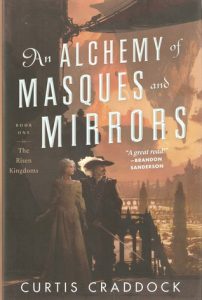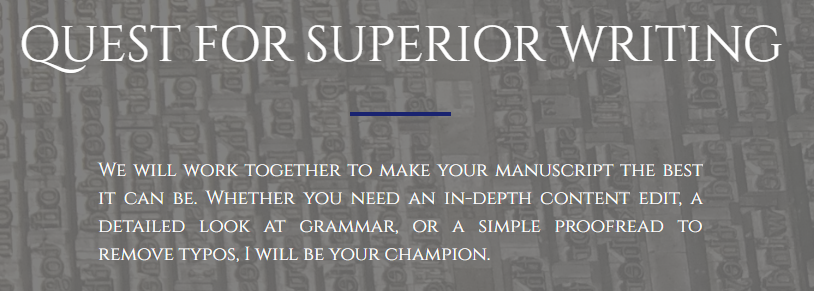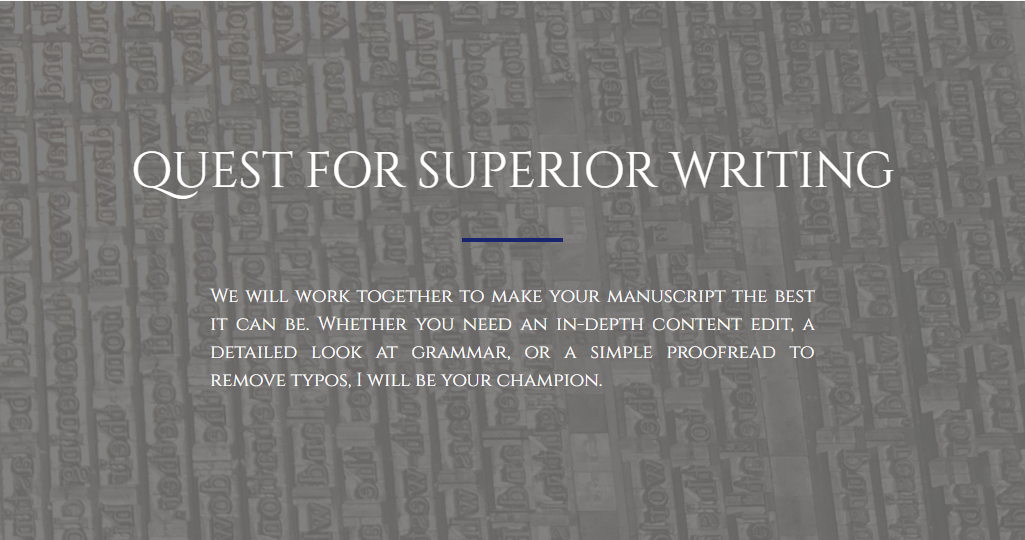I’m going to tell you a secret: Editors aren’t perfect.
*cue collective gasp*
I know, I know. Now you’re asking, “Then why on earth should I be asking an imperfect editor to perfect my writing?” And, well, if absolute perfection is your goal, then I wish you godspeed on your quest… and hope you won’t try to hire me.
The truth is, perfection is impossible. No matter how many times you scour your writing, no matter how many eyes go over your pages, inevitably some errors will slip through the cracks.
The Impossibility of Perfection
 I just finished reading a rather excellent debut fantasy novel by Curtis Craddock called An Alchemy of Masques and Mirrors. It was published by Tor (my personal favorite New York publisher), a class act subsidiary of Macmillan, one of the Big 5 publishing houses. I don’t doubt that they hire quality editors and copyeditors and proofreaders. And even still, I found several small errors throughout the book. I even found two in the same paragraph: a missing space and an extra word. Interestingly, I didn’t even notice the second error until I looked at the paragraph again for this blog post. A sentence read “he found what was he was looking for”. The first time through, my brain automatically corrected it to “he found what he was looking for”—and I wouldn’t be surprised if your brain did the same thing just now.
I just finished reading a rather excellent debut fantasy novel by Curtis Craddock called An Alchemy of Masques and Mirrors. It was published by Tor (my personal favorite New York publisher), a class act subsidiary of Macmillan, one of the Big 5 publishing houses. I don’t doubt that they hire quality editors and copyeditors and proofreaders. And even still, I found several small errors throughout the book. I even found two in the same paragraph: a missing space and an extra word. Interestingly, I didn’t even notice the second error until I looked at the paragraph again for this blog post. A sentence read “he found what was he was looking for”. The first time through, my brain automatically corrected it to “he found what he was looking for”—and I wouldn’t be surprised if your brain did the same thing just now.
That’s the problem with typos (and brains). Our minds know what the text is supposed to say and often just fill in the blanks (or deletes words, as necessary). And this is why we need editors. Their fresh, trained eyes will see what our familiar eyes did not.
Now, it’s tempting for me to say, “Hey, I must be a better editor than whoever they hired because I found so many typos in this professionally produced book!” But in reality, it just reminds me that no matter how much attention we pay, something is going to be missed. But that doesn’t mean we shouldn’t try.
Editing Anyway
Should we all just hang up our hats, say “To heck with it, it’s never going to be perfect so I might as well write trash,” and not even try to improve our writing? Of course not! Just imagine how many errors would have gotten through to the final text if that book hadn’t had editors scouring it. Personally, I don’t have to imagine it because I work on improving books every day. No matter how good you are at writing, something can always be better. And that is why we hire editors.
I had this point driven home for me a few weeks ago when I agreed to do a “website swap” with a bunch of other editors I met on Facebook. We would all look at and edit each other’s websites. It was with great trepidation that I offered up my newly crafted internet child upon the altar of scrutiny. The great amount of angst I felt in agreeing to let other editors examine my work was a sobering reminder of how authors must feel when they submit their own brainchildren to me.
I needn’t have worried. The other editors were all professional, kind, and quick to give praise. Neither did they pull their punches when pointing out the errors on my website that had escaped my notice. Above all, they made great suggestions for the overall content of my website.
The Editors
Anna Lee-Popham, of Anna’s Edits, encouraged me to play up my knight theme. This was a suggestion that particularly resonated with me. My initial plan for the website had been to fully utilize my link to knighthood (i.e., my last name). But I shied away from it because I was afraid it wouldn’t work. Anna’s encouragement led me to embrace my theme to improve my branding, and the subsequent comments of the other editors confirmed her (and my) decision. On the smaller end of things, Anna also noted several links on my site that went the wrong place or opened in the same window instead of a new tab.
Linda Stuckey, of After Hours Creative Works, was my font bulldog. She pointed out that one of my pages was still in Helvetica, while all the rest were in Times New Roman. Font consistency was something I had tried particularly hard to work on, and yet I managed to miss an entire page—but Linda didn’t. She also gave me several knight pun ideas that I still plan to put in place eventually.
And Marisa Keller (my Cinzel font buddy), of MDK Wordsmith, gave me some excellent advice on overall website complexity and cohesion that I’m still working on implementing.
All three gave me plenty of useful suggestions, as well as reassuring me of the things I had done well. I was particularly grateful for the all the small things they caught, the things that had slipped through the cracks. The whole experience was extremely productive and positive.

Utilizing Feedback
Let it be noted that I did not make every single change these lovely ladies suggested. This is key when responding to editing: you don’t have to accept every single suggested change! That doesn’t mean they were wrong to make the suggestions.
For example, Linda questioned whether my use of the term fin-de-siècle would be understood by the general public. She raised good questions, and I pondered the implications before ultimately deciding to stick with my original word. I reasoned that the word would resonate with my intended audience for that particular paragraph (historians), that I had used it correctly, and that people are free to google things if they are interested. She rightly pointed out to me the costs of using that word (potential confusion) and I decided to pay them instead of switching to a less costly word.
Even though I ultimately disagreed with her suggestion, I didn’t dismiss it out of hand. That, I think, is any editor’s request to their authors: at least consider what we have to say. Some of our suggestions are objective fact—sometimes conventions dictates that a comma needs to go there, or that word is simply wrong. This is particularly true in copyediting and proofreading. But a lot of our suggestions, especially in developmental and line editing, are more subjective. Our job is to point out potential confusion, awkward language, things that will draw the reader out of the text. Your job is to weigh the costs and the benefits and ultimately decide whether or not our suggestion resonates with you.
Quis Custodiet Ipsos Custodes?
I don’t speak Latin, but I believe the answer to that would be “Alii Custodes”. Who watches the watchers? Other watchers. Who edits the editors? Other editors. This is why it’s not a bad idea to hire two different editors for your manuscript: one to do a comprehensive developmental and line edit, then a fresh pair of eyes to proofread for remaining errors.
Because editors aren’t perfect. We never claimed to be. We just want to make your writing as good as we possibly can.
(And, by the way, I highly recommend An Alchemy of Masques and Mirrors! A broken world filled with intrigue, magic, flying skyships, and compelling characters. I thoroughly enjoyed it!)

